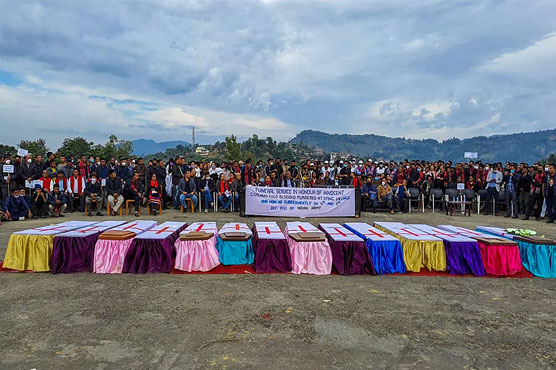Mourners defy curfew to bury 14 civilians killed by Indian troops

Mourners defy curfew to bury 14 civilians killed by Indian troops
NEW DELHI (AFP) - Hundreds of mourners defied a curfew Monday to bury 14 civilians shot dead by the Indian army during a botched ambush and confrontation with a crowd angered by the attack.
An elite military commando unit shot dead six coal miners returning to their homes in remote northeastern Nagaland state on Saturday, believing they were targeting insurgents.
Another eight people were killed by troops when they were confronted by a furious crowd, with a soldier also killed and a military vehicle set alight.
Hundreds of locals carried the victims’ coffins to a public ground in Mon district to conduct prayers, ignoring a round-the-clock curfew and internet blackouts imposed after the violence.
The mourners were later joined by Nagaland chief minister Neiphiu Rio, who has slammed the military over the killings and ordered an investigation.
At least two protesters were shot dead on Sunday after an angry crowd attacked and partially set alight an army installation in the region.
District health officer Lolekhol, who goes by one name, told AFP that both had died of their wounds in hospital, while another 10 had been injured in the clashes.
Street protests across the state were held for a second day on Monday, the morning after a candlelight march for the victims in state capital Kohima.
A police source told AFP that the situation was "tense but under control".
India’s army has said the miners were killed after they laid an ambush following "credible intelligence" of an armed insurgent group moving in the area.
Soldiers fired at a vehicle carrying the miners, killing six of them on the spot and leaving two others injured.
Dozens of angry villagers armed with sticks and machetes attacked the troops and forced them to open fire in "self defence", according to the military’s account.
It has ordered a court of inquiry and promised action.
Nagaland and other states in northeast India, linked to the rest of the country by a narrow land corridor, have seen decades of unrest among ethnic and separatist groups.
The region is home to dozens of tribal groups and small guerrilla armies whose demands range from greater autonomy to secession from India.

